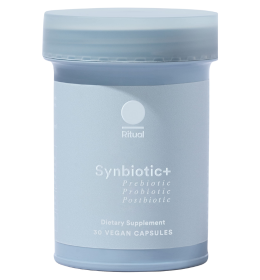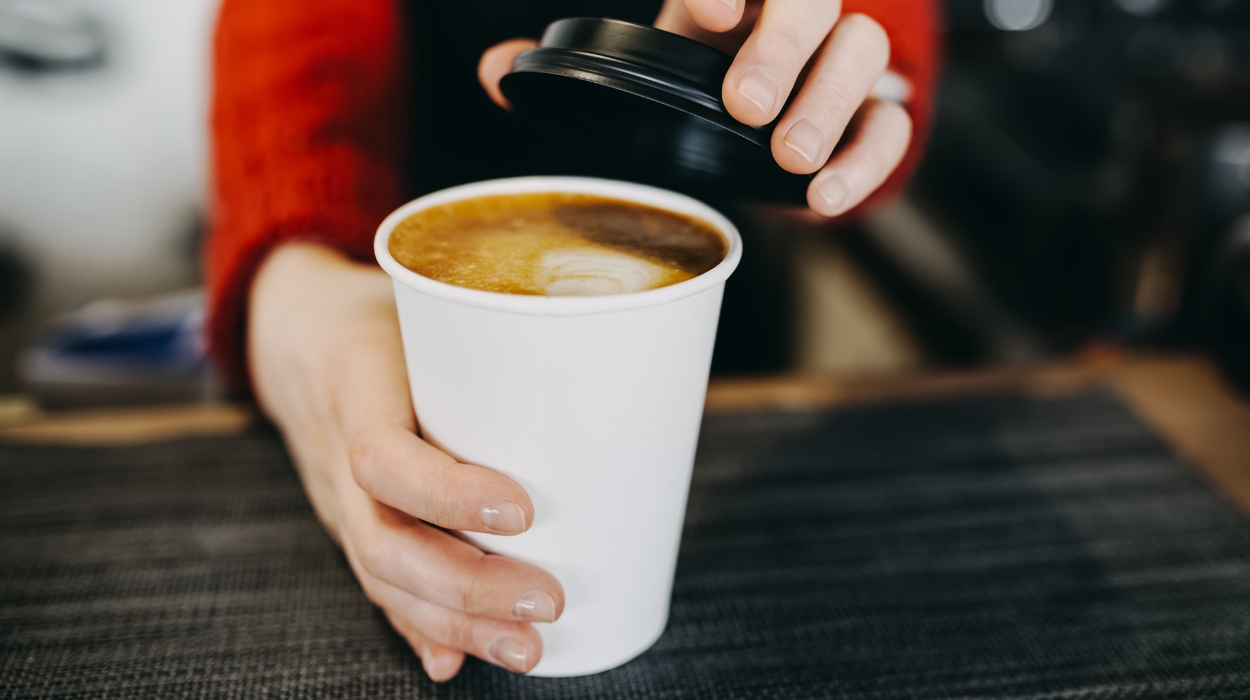Can coffee cause diarrhea? Yes, coffee and diarrhea may be linked in some people. If your morning brew leads to unexpected trips to the bathroom, coffee may be impacting your gut health.
Interestingly, probiotics may be beneficial for those experiencing diarrhea after coffee consumption.
Let’s discuss how coffee interacts with the digestive system and explore the potential link to diarrhea.
Can Coffee Cause Diarrhea?
Although some individuals notice loose stools after they drink coffee, there is no valid medical correlation between coffee and diarrhea.
Artificial sweeteners and dairy products added to coffee, in addition to certain gastrointestinal disorders, may be correlated with coffee and diarrhea. Additionally, too much coffee can cause diarrhea and stomach discomfort from caffeine intoxication.
Contact your healthcare provider if you have digestive symptoms after drinking coffee.
Does Coffee Give You Diarrhea?
The question of coffee causing diarrhea has circulated for some time. However, research remains scarce as to whether or not there is an actual correlation between coffee consumption and diarrhea.
While reliable medical research is not readily available, many believe coffee makes you poop. Several studies have looked at the association between colon motor activity and coffee. Some suggest that coffee stimulates colic motility,[1] activating parts of the gastrointestinal tract.
Research shows that coffee consumption does change the composition of the gut microbiota and stimulates gastric, biliary, and pancreatic secretion. However, no research indicates how coffee may directly affect bowel movements.
Still, some studies show that high doses of caffeine can induce adverse side effects such as gastrointestinal distress, which can be associated with diarrhea.
Featured Partner Offer

Ritual Synbiotic+
- 3-in-1 formula: prebiotics, probiotics, and probiotics
- Supports a balanced gut microbiome
- Supports bloating, gas, and diarrhea
- Supports the growth of beneficial gut bacteria
- Vegan and Third-party tested
Why Does Coffee Give You Diarrhea?
Although research is limited, there are several reasons why some individuals may feel coffee consumption is linked to digestive health.
Stimulant Effect
Caffeine is classified as a central nervous system stimulant. It can easily impact a person’s mood, attention, processing speed, and memory. Some report coffee having the same stimulating effect on the gastrointestinal system.
Coffee increases colonic activity, according to research, increasing pressure waves and stimulating contractions in the colon. This same research shows coffee intake can change the frequency and consistency of stools, with 29% of research studies reporting a compelling need to defecate after coffee ingestion.
As the primary pharmacologically active substance in coffee, caffeine may also create digestive system problems in some patients. Although the data is inconclusive, it has been suggested that caffeine ingestion impacts net fluid movement and transit times.
For example, Its impact on colonic motor activity in healthy humans is 60% stronger than water. Therefore, some individuals may experience more frequent bowel movements after drinking coffee.
Gastric Acid Production
Coffee promotes the release of gastrin, a hormone that stimulates stomach acid production. In some individuals, this may impact gut health and the digestive process. Ultimately, some people may feel this causes diarrhea.
Individual Sensitivity
Some people are more sensitive to coffee and its compounds than others. Individual sensitivity may make some individuals more prone to digestive distress, including diarrhea. Caffeine metabolism may be enhanced for elderly individuals, with older studies showing that caffeine sensitivities may increase with age.
Additives
For some, the diarrhea may go beyond the actual coffee. Coffee is one of the most popular beverages in the world. Meeting colleagues at the local coffee shop and sharing gossip over a cup of coffee with friends have quickly become normal activities with peers.
With effective marketing strategies from the most popular coffee distributors, specialty and flavored coffees are trending. So, experiencing diarrhea after drinking a vanilla latte may actually be caused by what’s in your cup of coffee, not the coffee itself.
For instance, the milk and dairy products added to coffee may be a major culprit, as those with lactose intolerance experience digestive reactions.
How Coffee Affects Your Digestive System
Although research is limited, it has been found that coffee affects the digestive process in a few key steps.
First, coffee activates the secretion of salivary alpha-amylase, an enzyme involved in starch digestion. Coffee also stimulates the stomach hormone gastrin and hydrochloric acid to be secreted and produced, assisting digestion.
Bile and pancreas secretions are also stimulated by coffee in the small intestine. Both regular and decaffeinated coffee are known to stimulate the gallbladder, allowing bile and pancreatic enzymes to aid in digestion.
Potential Benefits And Effects Of Coffee
Although caffeine has been known to raise blood pressure or hypertension, drinking coffee is associated with a lower risk of hypertension. Other potential health benefits include:
- Decrease in prevalence of heart attack.
- Reduced risk of type 2 diabetes and metabolic syndrome.
- Beneficial associations with Parkinson’s and Alzheimer’s disease.
- Reduced risk of gallstones, kidney stones, and different liver conditions.
Coffee is also known to exert antioxidant and anti-inflammatory effects on the digestive tract.
Coffee consumption may particularly affect those with inflammatory bowel diseases such as Crohn’s disease, ulcerative colitis, and irritable bowel syndrome. Additionally, coffee significantly impacts the intestinal microbiota composition and the types of bacteria present in the digestive system.
While more studies are needed to clarify the potential health consequences of coffee intake in this regard, the microbiota composition is linked to several health disorders. Coffee is reported to be beneficial for inflammatory bowel disease, non-alcoholic liver steatosis, cardiovascular diseases, diabetes, obesity, cancer, and Parkinson’s disease.
What Kind Of Coffee Makes You Poop?
It is not necessarily the specific types of coffee but their chemical composition and roasting processes that can make you poop. Some coffee-related factors may encourage a restroom visit:
- Caffeinated Coffee: Caffeine can increase peristalsis, the contractions that move food through the intestines. Regular coffee, espresso, and other varieties can have a stimulant effect on some individuals.
- Acidity: Coffee is inherently acidic, which can increase stomach acid levels and impact bowel movements.
- Temperature: Warm or hot beverages may stimulate bowel movements more than iced coffee drinks.
- Dark Roasts: Some believe dark roast coffee is less likely to affect the stomach than lighter roasts due to its lower acidity and caffeine content.
- Half-Caffeinated Coffee: Drinking coffee containing less caffeine may still keep the digestive system moving.
It is important to note that everyone’s body is different. While coffee might stimulate a bowel movement in one person, it might not have the same effect on someone else. The response depends on individual sensitivities and your overall diet makeup.
How To Stop Diarrhea From Coffee
If you feel that drinking coffee impacts your digestive system, you can learn how to stop diarrhea with these strategies:
- If you drink coffee several times a day, try cutting your intake to see if there’s a difference. You may also want to stop drinking coffee altogether to note any changes.
- Switch to decaf coffee to avoid diarrhea. Since some individuals are only sensitive to regular coffee, switching to decaffeinated coffee can help.
- Choose cold brew coffee, which is typically less acidic than regular coffee.
- Avoid additives such as cream and milk if you are lactose intolerant. Some individuals are also sensitive to artificial sweeteners, so experiment with limiting or avoiding these to see if it helps.
- For some people, coffee is more likely to cause diarrhea on an empty stomach. If this is the case for you, try having a snack or meal first.
- Limit other foods and beverages that can irritate the gut, such as fried foods, high-fat foods, spicy foods, milk, and high-sugar juices. In addition, consider adding probiotic foods to your diet. If you already have issues with gut flora balance, try adding gut-healing foods to your diet.
- Consult with your doctor. If you’ve tried multiple strategies and still experience diarrhea when drinking coffee, speaking with your healthcare provider might be helpful. They can suggest healthy alternatives to caffeine, like vitamin supplements that can help naturally increase your energy.
The Bottom Line
While coffee is an integral part of many morning rituals, some individuals believe drinking coffee causes them to have loose stools. Although research is limited, factors like caffeine, acidity, and additives may affect your ability to properly digest coffee without side effects.
By adjusting your coffee intake and choosing gentler brew methods, you can enjoy your piping hot cup of coffee without discomfort or worry.
Frequently Asked Questions
Some individuals experience diarrhea as coffee stimulates digestion.
The most common cause of diarrhea is from contaminated foods, especially from bacteria like E. coli and Salmonella.
It’s advised to monitor food intake to watch for trigger foods with IBS. Consult your healthcare professional if coffee seems to exacerbate symptoms.
Bananas, white rice, apple sauce, plain pasta, and toast are some foods that can stop your diarrhea.
Drinking caffeine equal to or above 200 milligrams can lead to caffeine intoxication that causes gastrointestinal upset. It’s crucial to consume energy drinks with caution.

